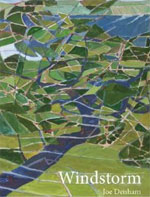
At first glance, it seems Nicola Barker has left behind the dark, menacing, labyrinthine world of Darkmans for sunnier, simpler climes – a quaint, pleasant village, the setting of Burley Cross Postbox Theft. Then again, whether you know this author by reputation or by past experience with her singular collection of works, do you really think she would pen a straightforward, conventionally charming epistolary novel along the lines of, say, The Guernsey Literary and Potato Peel Pie Society?
Any such misapprehensions are quickly set aside as the first letter detailing the village’s recent postbox (mailbox) theft case is teed up … and devastatingly tees off on its recipient. That first letter is ostensibly a directive from a police sergeant to a police constable, instructing the constable to take over the investigation of the theft and recovery of a box of mail shortly before Christmas. That missive rapidly takes on strange intensity and personal viciousness, seemingly for nothing more than perverse reasons, as Sergeant Everill taunts Constable Topping on besting him in everything from job promotions to romance. Everill’s odd, manic outbursts carry with them more than a shade of the troubled Dory from Darkmans, a character who was possibly clinically schizoprenic. Before the reader can figure out what to make of it, the book rolls on into the seemingly random collection of letters that make up the recovered postbox plunder.
There are three types of epistolary novels (1): monologic (giving the letters of only one character), dialogic (giving the letters of two characters), and polylogic (with three or more letter-writing characters). In addition, a crucial element in polylogic epistolary novels (such as Dangerous Liaisons) is the dramatic device of ‘discrepant awareness’, wherein the simultaneous but separate correspondences of the heroines and the villains create dramatic tension. Burley Cross Postbox Theft is an arresting amalgam of all three, capturing connections made and missed.
Many of the diverted letters are comic monologues about life’s petty annoyances, ballooned into hyperbolic diatribes. Other monologues capture loneliness, longing and yearning. The inventory of the ill-fated Auction of Promises is a unique monologue of good intentions going horribly awry.
The book as a whole is a cacophonous polylogue, seemingly random at first but falling together in interesting, startling and often heartrending fashion as each letter is opened. The interjections of an opinionated translator form a kind of dialogue with her interpretation of one letter for which the need for translation is not entirely clear. Finally, the collection of letters is framed by a dialogue of sorts between assigning sergeant and investigating constable, where PC Topping renders both the final word as well as a singularly soul-redeeming monologue.
Throughout, Barker populates this written – sometimes scribbled, sometimes meticulously typed and tapped out – chorus with characters who run the sympathetic gamut, from quirky, forlorn and wistful to bewildering, manic and kinda scary, to the edge of irredeemable. And this is just as Barker would have it for the readers willing to hang in with her often dense, often thorny, always rewarding stories:
‘There are writers who exist to confirm people’s feelings about themselves and to make them feel comforted or not alone. That’s the opposite to what I do. I’m presenting people with unacceptable or hostile characters, and my desire is to make them understood.’(2)
Not only does she make her disparate tangle of souls understood by the end, but Barker sews it up elegantly, organically and in a way that is both uplifting and just a touch satisfyingly vindictive. It’s delicious.
In this day and age – and Burley Cross Postbox Theft is firmly set in the present – why should anyone care if some random bits of paper get lost in the increasingly dismissed and antiquated post? Barker addresses that in fine fashion, too, as part of PC Topping’s summing up of the postbox theft mystery:
“Let’s see … I know that pubs are on their way out (hundreds are closing every week), that they’re merely a sad reminder of things past (the way we once were, The Good Old Days), just like ‘community spirit’ is, and communities themselves, and churches, and local bobbies, and pickled walnuts, and brass bands at fetes, and tall hedgerows, and handwritten letters, and home-cooked meals, and sparrows, and boredom, and books, and gob-stoppers, and ladybirds, and innocence … Yes. All for the high jump. All for the chop. All nearly eclipsed, now (may they rest in peace), by a much bigger, brighter future, in twenty-four-hour digital HD.”
But just as PC Topping didn’t buckle under Sergeant Everill’s verbal assault when passed the postbox theft assignment, so his seeming rueful lament for a world quickly passing by is actually no lament at all, but a gentle yet pointed reprimand. Just as he plausibly disentangles the postbox theft and sorts out who needs to see which of the misdirected missives, his self-effacing tidying up at the end seems to more profoundly echo E.M. Forster’s beloved call to “only connect.”
Notes
1. Wikipedia: http://en.wikipedia.org/wiki/Epistolary_novel
2. ‘I won’t make you feel better’
Nicola Barker revels in giving her readers hostile characters in odd locations. No wonder she’s addicted to Big Brother …
http://www.guardian.co.uk/books/2007/apr/29/fiction.features3
by Alex Clark, The Observer, April 29, 2007



